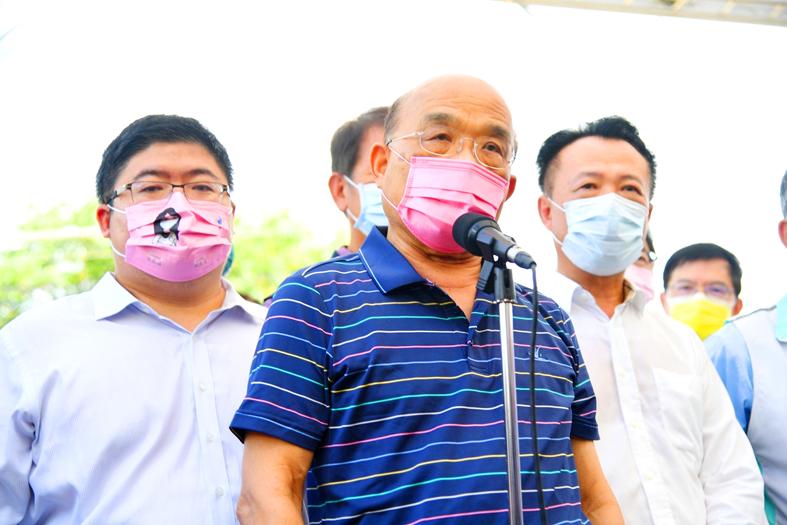Taiwan would not collapse like Afghanistan in the event of an attack, Premier Su Tseng-chang (蘇貞昌) said yesterday, offering an indirect warning to China not to be “deluded” into thinking it could take Taiwan.
China has been ramping up military and diplomatic pressure to force Taipei into accepting Chinese sovereignty, causing concern in Washington and other Western capitals.
The defeat of the Afghan government after the withdrawal of US forces and flight of Afghan President Ashraf Ghani has sparked discussion in Taiwan about what would happen in the event of a Chinese invasion, and whether the US would help defend Taiwan.

Photo: CNA
Asked whether the president or premier would flee if “the enemy was at the gates” like in Afghanistan, Su said people had feared neither arrest nor death when Taiwan was a dictatorship under martial law.
“Today, there are powerful countries that want to swallow up Taiwan using force, and likewise we are also not afraid of being killed or imprisoned,” he said. “We must guard this country and this land, and not be like certain people who always talk up the enemy’s prestige and talk down our resolve.”
What happened in Afghanistan showed that if a country is in internal chaos, no outside help would make a difference, and Taiwanese have to believe in their land and that they can defend it, Su added.
Everyone working together to rapidly bring under control a recent domestic spike in COVID-19 infections showed what can be achieved when Taiwan is united, he said.
“We also tell foreign forces who want to invade and grab Taiwan — don’t be deluded,” Su added, apparently referring to China.
In related news, Taiwan’s two largest airlines yesterday said that flights to and from Europe would circumvent the airspace in Afghanistan.
China Airlines Ltd (中華航空) said that all cargo and passenger flights to and from Europe would fly through Siberia or other alternative routes after bypassing the airspace in Afghanistan.
EVA Airways Corp (長榮航空) said it would enforce the same air safety policy, which would affect all of its flights to and from Amsterdam, London, Vienna and Paris.
Airlines in recent years have bypassed airspace above war zones and politically unstable nations following a couple of major aviation incidents.
On July 17, 2014, Malaysia Airlines Flight 17 from Amsterdam to Kuala Lumpur was shot down by a ground-to-air missile while flying over eastern Ukraine, killing 298 people aboard.
On Jan. 8 last year, Ukraine International Airlines Flight 752 from Tehran to Kiev was hit by two missiles fired by the Iranian Islamic Revolutionary Guards shortly after takeoff from Tehran Imam Khomeini International Airport. All 167 passengers and eight crew members died.
Additional reporting by Shelley Shan

PREPAREDNESS: Given the difficulty of importing ammunition during wartime, the Ministry of National Defense said it would prioritize ‘coproduction’ partnerships A newly formed unit of the Marine Corps tasked with land-based security operations has recently replaced its aging, domestically produced rifles with more advanced, US-made M4A1 rifles, a source said yesterday. The unnamed source familiar with the matter said the First Security Battalion of the Marine Corps’ Air Defense and Base Guard Group has replaced its older T65K2 rifles, which have been in service since the late 1980s, with the newly received M4A1s. The source did not say exactly when the upgrade took place or how many M4A1s were issued to the battalion. The confirmation came after Chinese-language media reported

The Taiwanese passport ranked 33rd in a global listing of passports by convenience this month, rising three places from last month’s ranking, but matching its position in January last year. The Henley Passport Index, an international ranking of passports by the number of designations its holder can travel to without a visa, showed that the Taiwan passport enables holders to travel to 139 countries and territories without a visa. Singapore’s passport was ranked the most powerful with visa-free access to 192 destinations out of 227, according to the index published on Tuesday by UK-based migration investment consultancy firm Henley and Partners. Japan’s and

A Ministry of Foreign Affairs official yesterday said that a delegation that visited China for an APEC meeting did not receive any kind of treatment that downgraded Taiwan’s sovereignty. Department of International Organizations Director-General Jonathan Sun (孫儉元) said that he and a group of ministry officials visited Shenzhen, China, to attend the APEC Informal Senior Officials’ Meeting last month. The trip went “smoothly and safely” for all Taiwanese delegates, as the Chinese side arranged the trip in accordance with long-standing practices, Sun said at the ministry’s weekly briefing. The Taiwanese group did not encounter any political suppression, he said. Sun made the remarks when

BROAD AGREEMENT: The two are nearing a trade deal to reduce Taiwan’s tariff to 15% and a commitment for TSMC to build five more fabs, a ‘New York Times’ report said Taiwan and the US have reached a broad consensus on a trade deal, the Executive Yuan’s Office of Trade Negotiations said yesterday, after a report said that Washington is set to reduce Taiwan’s tariff rate to 15 percent. The New York Times on Monday reported that the two nations are nearing a trade deal to reduce Taiwan’s tariff rate to 15 percent and commit Taiwan Semiconductor Manufacturing Co (TSMC, 台積電) to building at least five more facilities in the US. “The agreement, which has been under negotiation for months, is being legally scrubbed and could be announced this month,” the paper said,